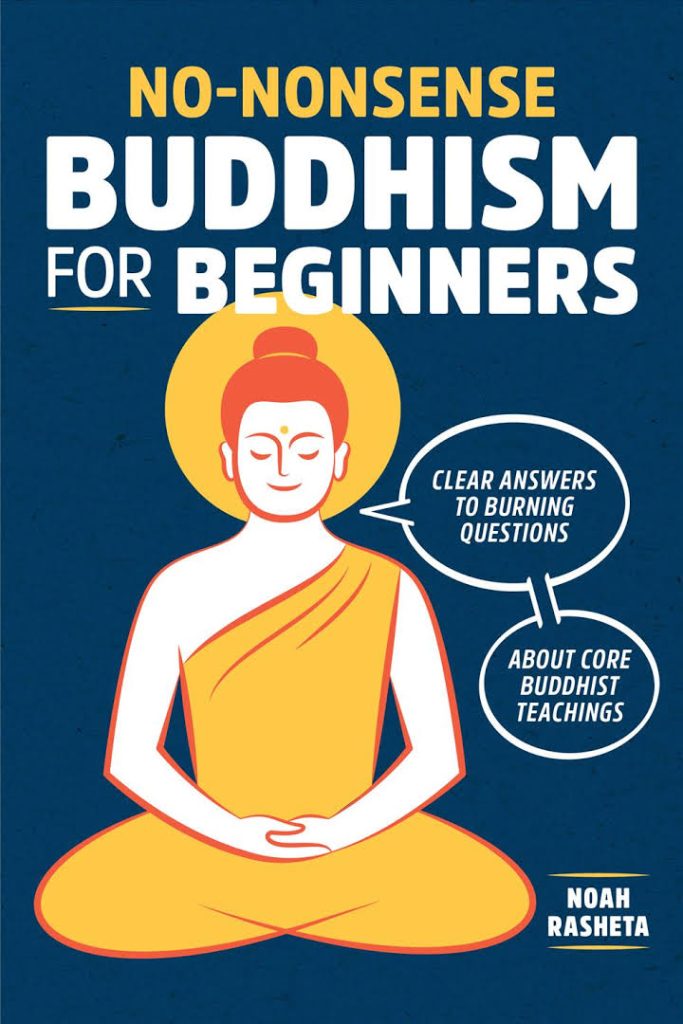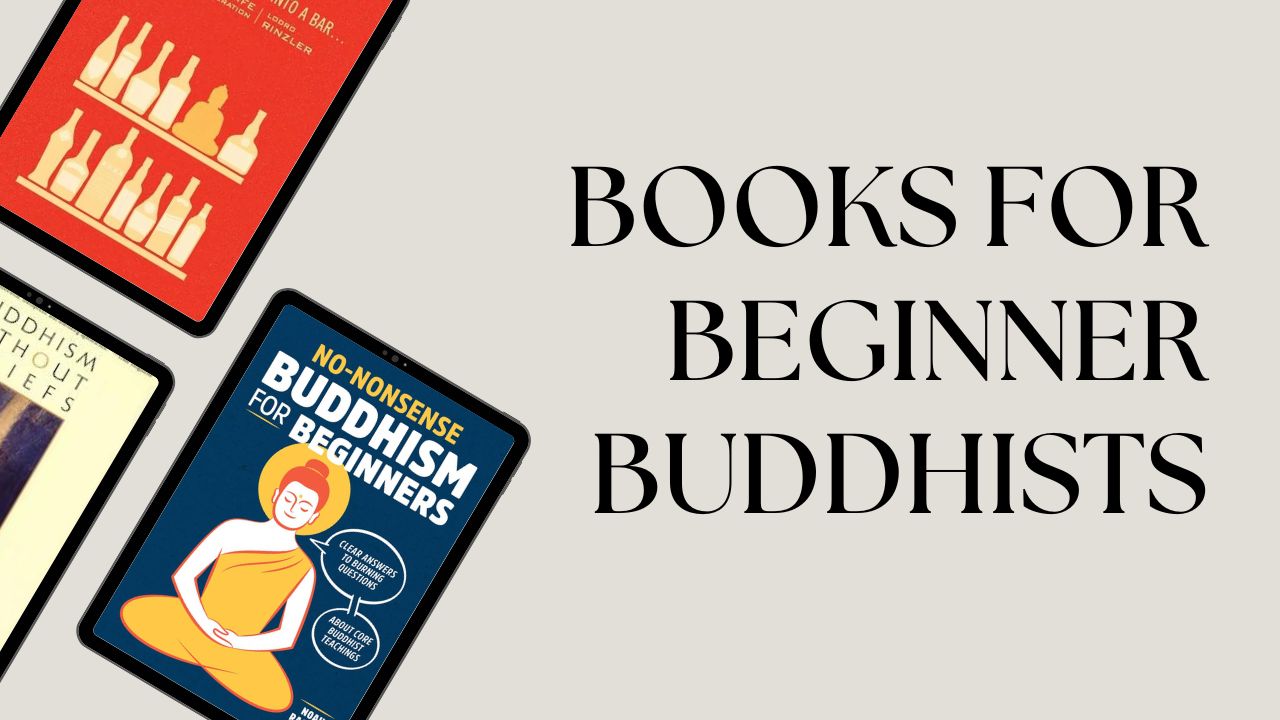Some links on this post may link to affiliate pages that offer compensation to the author of this post.
Welcome to the first of hopefully many mindfulness blog posts! Today I wanted to start with the 5 Buddhism books that I read while undergoing my own exploration into the world of Buddhism. So without any further ado, here are the 5 best books to read for beginners Buddhism!
The first book – No-Nonsense Buddhism for Beginners: Clear Answers to Burning Questions About Core Buddhist Teachings | Noah Rashad
This first one is a personal favorite of mine. As I was undergoing a faith transition of my own, I wanted a book that helped me understand this ‘godless.’
This absolute gem of a book is short, simple and gets straight to the point so you can understand if there is a world where you might be active Buddhism.
The author, Noah Rashad, is an American-born Zen Buddhist and ordained Soto priest in the Japanese Soto tradition. He is the founder of the Zen Mountain Monastery in upstate New York, one of the largest Buddhist monasteries in North America.

Noah Rash has published a number of books on Buddhism, including No-Nonsense Buddhism for Beginners: Clear Answers to Burning Questions About Core Buddhist Teachings, and even runs his own podcast about Buddhism!
When I was first looking into Buddhism, this was my favorite podcast and I couldn’t wait for the next episode.
The first book he published was No-Nonsense Buddhism for Beginners which was published in 1994. It’s a straightforward introduction to core Buddhist teachings that is both clear and concise. This was my personal introduction to secular Buddhism and I come back to it all the time!
Second book – The Heart of the Buddha’s Teachings | René Ruiz, Thích Nhất Hạnh
This one is often recommended by many in my sangha or community. Once you feel you have the basics of Buddhist teaching down, you might explore some of the more academic facets of this global religion. That’s where this book often becomes a common recommendation.
To do so, I might also recommend The Heart of the Buddha’s Teaching by a Vietnamese Buddhist monk, Thich Nhat Hanh.
The book was first published in 1964 and has been translated into over 30 languages. It is a collection of talks given to Westerners on the practice and meaning of Buddhism.

I don’t particularly identify as a Zen Buddhist but I feel that Tich Nhat Hanh does a great job of bringing Buddhist concepts down to earth. In my previous faith, there was a big emphasis on doing everything right and following all the rules, despite whether or not you were happy.
Thay (or teacher as his students call him) teaches in a way that has always made me feel comfortable in the religion without getting caught up in the “am I doing all the right things” anxiety that can come with many religious tendencies.
The Heart of the Buddha’s Teachings is an essential guide for me to understand the heart of Buddhism and its meditation practices. It will teach you how to find peace within yourself and in your everyday life.
In this book, Thich Nhat Hanh explains that there are two types of meditation: mindfulness (awareness) and insight (wisdom).
He believes that both are necessary for true transformation, but mindfulness without insight can be a waste of time. Insight without mindfulness could lead to fanaticism. For any newcomer to the Zen Buddhism way of life, this is a must-have.
Third Book – The Buddha Walks into a Bar…: A Guide to Life for a New Generation
Buddhism at times can feel a bit like a pie in the sky religion that can make it hard for many to access.
That why I also really love the book “The Buddha Walks into a Bar” by American author Dan Harris. The book covers the basics of Buddhism and discusses what it means to be Buddhist in the modern world.

When many people first start to look into the world of Buddhism, they might feel that there are parts of the religion that do not apply to them or that do not align to their beliefs.
For example, it used to be a common zen practice to avoid alcohol completely, avoid the use of “mind-altering substances” and even intimate relationships.
But in the modern era, there are many ways of mindfully practicing Buddhism while maintaining a very healthy relationship with your political views, consumption tendencies, and values.
If you have felt confused about whether or not you can practice Buddhism and maintain your favorite parts of your lifestyle, this is a must-have.
The book is divided into two sections: Part One, “A Beginner’s Guide to Buddhism,” and Part Two, “A Beginner’s Guide to Life.” In the first section, Harris explains what it means to be Buddhist in the modern world.
He also explains how meditation can help with anxiety and stress. In the second section, he talks about how to live a good life in general.
This method of outlining the practice and separating it from hard and fast rules is another great way of becoming organized with your meditation practice in your life.
Fourth Book – In the Buddha’s Words: An Anthology of Discourses from the Pali Canon
This book recommendation is for the “bookish” among us that want to read all the literature we have available!
In the Buddha’s Words is an anthology of Buddhist texts from the Pali Canon.
It was translated by Bhikkhu Bodhi, who has spent over six years studying and translating the Pali Canon.
In the Buddha’s Words is a collection of texts that are categorized into three sections: The Foundations of Mindfulness, The Wings to Awakening, and Beyond the Reach of Thought.

Bhikkhu Bodhi presents this book as a way for readers to experience what it would be like to live in accordance with Buddhist teachings.
He says that these teachings are not meant to be just read about but also practiced. As many of us leave older religions that encouraged deep study of ancient texts, this book will scratch that itch that comes with a faith transition.
Last Book- Buddhism Without Beliefs: A Contemporary Guide to Awakening | Stephen Bachelor
After reading Noah Rashad’s book, I decided I wanted something a bit more focused in athiesm and agnosticism. What many agnostics or athiests might not realize, is Buddhism has been a religion for many years and has been followed by many people.
However, it is not a religion that is based on belief. Buddhism can be practiced by anyone who wishes to do so.
Stephen Bachelor’s book, Buddhism Without Beliefs: A Contemporary Guide to Awakening, is about how he became an atheist Buddhist and what that means for him.

In this book, Bachelor explores the idea of how Buddhism can be practiced without any beliefs or faith in any higher power.
He explains how he came to the conclusion that there was no need for him to believe in anything supernatural or divine because he could find peace and understanding through meditation and mindfulness practices.
I hope this list has been helpful in your journey! Some of the links on this page may offer me some degree of compensation. Thank you for your support and if you have a question, consider leaving a comment!
Thanks for reading to the end of this post. If you find the information I provide to be helpful, please consider subscribing.
Disclaimer: None of the information presented on this site constitutes legal, business, tax, or medical advice. In each scenario, it’s recommended to first chat with a medical, legal, business, or tax professional before making any decisions.


